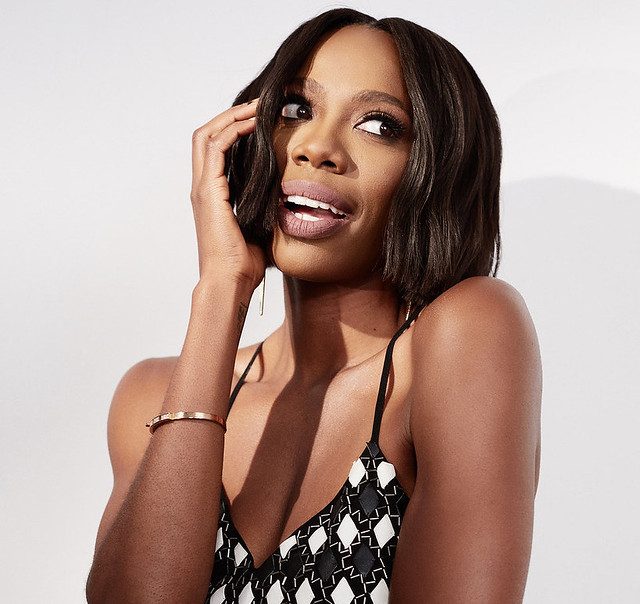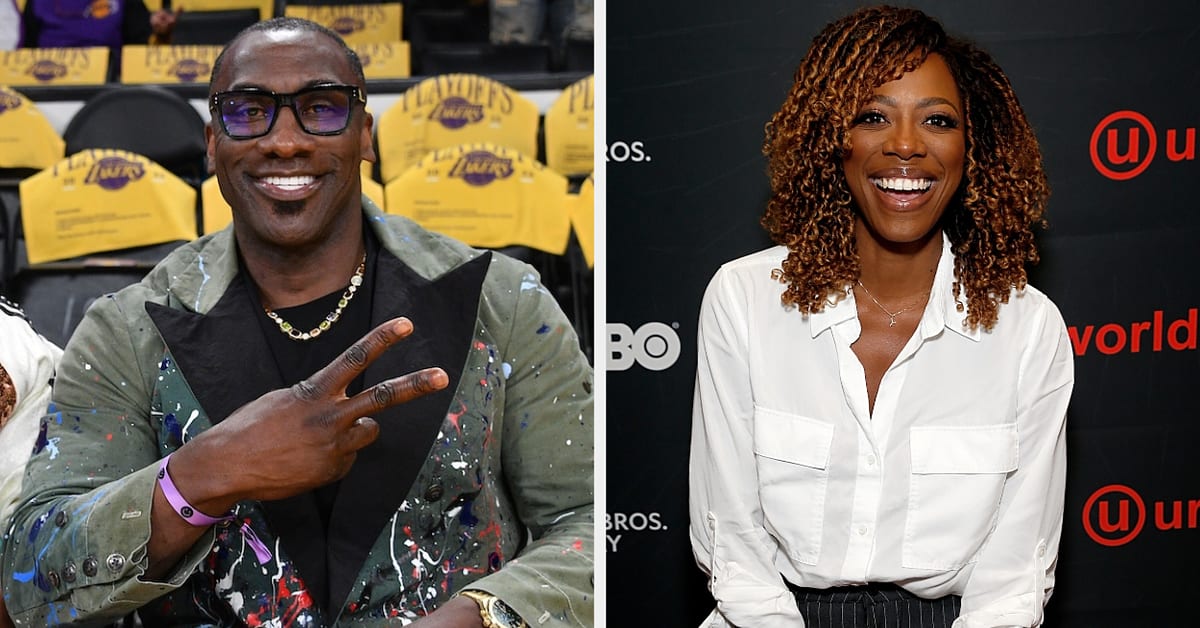In today’s media landscape, where soundbites can trend faster than full interviews and memes often override context, celebrities walk a razor-thin line between private opinions and public fallout. The recent media whirlwind involving sports analyst and former NFL tight end Shannon Sharpe, actress and comedian Yvonne Orji, and separate legal allegations has become a prime example of how quickly narratives can spiral in unexpected and often conflicting directions.
The Viral Clip: Humor or Disrespect?
It all began during an episode of Shannon Sharpe’s podcast Nightcap, where Sharpe and fellow former NFL player Chad “Ochocinco” Johnson were engaging in a spirited conversation. Chad Johnson suggested that Yvonne Orji, known for her role on HBO’s Insecure and her outspoken Christian faith, would be a good match for Sharpe. Orji has been publicly candid about her decision to remain a virgin until marriage, a choice that has drawn both praise and scrutiny over the years.
Sharpe, in a moment that was clearly intended to be humorous, responded: “I need a sinner,” referencing his interest in women who are the opposite of Orji’s public persona. He jokingly added that adult film star Pinky was more his type. The comment, which was clearly delivered in jest, went viral across social media platforms, with many interpreting it as a direct rejection of Orji based on her lifestyle choices.
But was Sharpe’s comment truly that serious? Or was it simply part of the entertainment-infused banter that defines much of online content today?
Public Reaction: Divided and Amplified
The response was immediate—and divisive.
On one side, some viewers laughed it off, understanding the humor in the moment. Shannon Sharpe, after all, is known for his candid, sometimes outrageous takes. His style blends charisma with a comedic edge, and many fans have come to expect nothing less from his appearances.
However, others saw the comment as dismissive and emblematic of a larger societal issue: the devaluation of women who choose celibacy, faithfulness, or traditional values in favor of more sensationalized and hypersexualized images of femininity. Critics argued that Sharpe’s words, even in jest, reflected a troubling trend where women like Yvonne Orji are seen as “boring,” “prudish,” or “undesirable” simply for not aligning with mainstream ideas about relationships and sexuality.
Yvonne Orji, for her part, did not publicly respond to the comment, which may speak volumes in itself. The silence might reflect a choice to stay above the fray or a recognition that the moment was not worth dignifying with a response.

Context Is Key: Entertainment vs. Reality
To understand this incident fully, it’s important to distinguish between Shannon Sharpe the entertainer and Shannon Sharpe the individual. Podcast banter is designed to entertain. Exaggerated opinions, outlandish claims, and controversial jokes often draw attention, boost engagement, and generate headlines—exactly what happened here.
Yet the danger lies in the blurred lines. In an era where clips are stripped of their original context and shared in echo chambers, even the most offhand remark can be weaponized or misinterpreted.
Sharpe’s “I need a sinner” comment was neither an official statement nor a personal attack, but a flippant remark in a comedic setting. Still, when celebrities speak—even in jest—they carry the weight of influence and the risk of backlash.
Who Is Yvonne Orji?
Yvonne Orji is a Nigerian-American actress and comedian who rose to fame with her role as Molly Carter on Insecure. What sets her apart is not just her talent, but her transparency about her Christian faith and decision to remain a virgin until marriage. In a world where celebrities often feel pressured to conform to certain images, Orji has consistently held firm in her values.
In 2020, she released a stand-up special on HBO titled Momma, I Made It! that combined comedy with personal storytelling. She’s used her platform to talk about issues ranging from religion and identity to culture shock and dating as a celibate Christian in Hollywood. Whether one agrees with her views or not, there’s no denying that Orji brings a rare voice to the entertainment industry.
The Deeper Issue: What Do We Value in Public Figures?
Sharpe’s comment inadvertently exposed a deeper cultural question: What kind of women are celebrated in media today?
While sex-positivity has empowered many women to express themselves freely, it has also created a false dichotomy between the “fun, bad girl” and the “good, boring girl.” This framing ignores the full complexity of women’s identities and reinforces damaging stereotypes. The idea that a woman must be sexually experienced or provocative to be attractive is not just outdated—it’s limiting.
Sharpe’s flippant remark may have touched a nerve because it reflects a broader social tendency to overlook or even mock those who live by principles that go against the grain.
From Jokes to Lawsuits: A Separate and More Serious Matter
While the Orji clip dominated social commentary, a separate and far more serious issue began unfolding in parallel.
In April 2025, Shannon Sharpe was hit with a civil lawsuit from a woman alleging sexual assault, battery, and intentional infliction of emotional distress. The woman, whose identity remains confidential, is seeking over $50 million in damages. According to her account, the incident occurred during what she describes as a non-consensual encounter.
Sharpe has publicly denied all allegations, referring to the case as a “shakedown.” He claims that the interaction was entirely consensual and has released what he describes as “exonerating” text messages exchanged between him and the accuser. Sharpe also announced plans to countersue for defamation, further escalating the legal and public battle.
These accusations have nothing to do with Yvonne Orji, yet many headlines and social media threads have confused the two unrelated matters, linking Sharpe’s comedic rejection of Orji with the much more serious legal developments.

Legal Experts Weigh In
Legal analysts have pointed out that civil suits involving high-profile individuals often attract attention and speculation, especially in the age of social media. They also caution that public perception can shift drastically depending on the legal outcomes, the release of additional evidence, or further testimony.
At this point, the allegations against Sharpe remain just that—allegations. No criminal charges have been filed, and the case is currently pending in civil court. Sharpe’s legal team has signaled confidence in their ability to refute the claims, and the matter will likely unfold over months, if not years.
Impact on Career and Public Image
Shannon Sharpe has enjoyed a successful post-NFL career as a broadcaster, commentator, and podcast host. Known for his eloquence, humor, and unfiltered takes, he has become a beloved personality across sports and entertainment media. But like many in the public eye, he now faces the dual pressures of maintaining his brand while navigating legal landmines.
The viral moment with Yvonne Orji may fade, but the lawsuit represents a real and potentially career-altering development. Brands, networks, and audiences are increasingly less tolerant of public figures embroiled in serious allegations, regardless of their status or past achievements.
Conclusion: When Humor and Headlines Collide
The Shannon Sharpe–Yvonne Orji moment serves as a reminder of the volatility of public perception. What was meant as a humorous exchange quickly morphed into a cultural commentary, spawning debates about values, gender expectations, and media responsibility. Meanwhile, the unrelated but much more serious legal accusations against Sharpe highlight how quickly a public figure’s life can turn under the weight of multiple controversies.
In the end, the key takeaway is this: context matters. Humor can be misunderstood, and justice must be pursued carefully and with due process. Public figures like Sharpe must recognize the weight of their words, while audiences must remain critical of how quickly and easily narratives can be manipulated or misinterpreted.
As the legal proceedings unfold and the media cycle continues, the question remains: can Shannon Sharpe weather both the jokes and the judgments?



